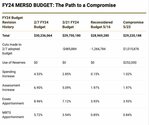




Ahead of a deadline to address a $781K approval gap in the Manchester Essex Regional School District's FY24 operating budget, the district's School Committee will vote on exactly which recommendation to bring to voters later this month.
"There are no good choices here," School Committee Vice Chair Chris Reed said in a working session last Thursday. "We're considering the best of the worst options."
And addressing that gap hasn't been easy. In the last three weeks, the School Committee has held multiple work sessions with administration officials, fielded hundreds of emails from concerned parents and residents, hosted a packed public hearing on May 23, and repeatedly met with town officials from Manchester and Essex to identify options that might thread the needle of being fiscal responsive while trying to preserve the educational programs that have made MERSD one of the top school districts in the state.
The committee will go into Tuesday with three basic options. Two represent a compromise that backs dramatically down from the "nuclear" scenario presented in its May 16 "reconsidered budget" that would have laid off teachers, eliminated the district's French language program, and cut monies from arts and STEM programs after Essex voters—facing disproportionate escalations in its share of the district budget—rejected a $289,000 Proposition 2½ override to fund the $29.75 million FY24 MERSD operating budget.
The layoffs and deep program cuts in the May 16 budget scenario prompted a public outcry at a May 23 public hearing. Hundreds of students, teachers, and parents showed up (with hundreds tuning in online) to appeal to the school committee, Manchester and Essex Select Boards, and members of both towns’ Finance Committees who were in attendance. Their message? Don't cut student programs. Find another solution.
The path to reducing the FY24 budget began in late March when the district reduced its $30.2 million budget by $485,884 to $29.75 million after it was clear that the 8.96% increase in Essex's share of the district budget would be "a bridge too far" for local voters. (Manchester's share, due to shrinking enrollment of local students, had a lower apportionment of 5.72%).
The district is currently in a 30-day window to produce a new final FY24 budget or make budget cuts to meet the spending level accepted by Essex before the override. The School Committee will consider two compromise budgets on Tuesday, each with a "live to fight another day" quality that would give the district a path to fix the genuine structural problems in its operational budget.
The compromise budget, presented on May 23 by MERSD Superintendent Pamela Beaudoin, would avoid layoffs and cut $791,992 from the budget. The package would retain all high school elective courses, cut staff only through teacher attrition and deferred hiring, reduce "COLA" cost of living increases to non-union staff, and tap $252,000 in district reserve funds. This would avoid teacher layoffs and elimination of critical programs, said Beaudoin. However, it would cut early intervention in reading and math—which district officials warn could result in more significant and expensive challenges later in a student's education—and defer the expansion of performing arts by delaying hiring a teaching coordinator.
Late bus service would also be eliminated from the budget.
At its meeting last week, the Essex Finance Committee voted to support the May 16 compromise budget's approach but stopped short of recommending specifics.
The second compromise option was offered last week by School Committee Member Jake Foster of Essex. Foster's compromise scenario emphasizes a much greater drawdown on district reserve funds.
Foster's proposal builds $250,000 in spending reductions (already covered by Beaudoin's option). t would use $1.2 million from district reserve funds for the capital expense of replacing two athletic fields used by the district. Manchester and Essex's voters have already approved the fields project at their Annual Town Meetings, but Essex has not yet finalized the mechanism of how it will fund its portion of that expense.
"It shows we are asking for less, and we’ve changed how we’re going to work," Foster said.
By tapping school district reserves for a large capital expense, said Foster, the district would be treating reserve funds properly and providing cuts to the budget asked for by Essex voters.
A reduction of $250,000 from the district's earlier budget should result in a $92,500 reduction to the town of Essex’s contribution and $157,000 from Manchester’s contribution. If successful, Foster said, the district would avoid starting next year's budget planning with a massive deficit, and the school committee can then use the opportunity to increase its due diligence of proposed budgets, ensure understanding of proposals, more clearly communicate with residents, and improve cross-organization discussions of budget and financing.
The final option is to do nothing, keep the original March version of the district's FY24 budget and force Essex to vote on the override again. Essex Selectman Peter Phippen on Monday said he is personally in support of the district's original budget that Essex voters defeated last month. He said the financial burden to Essex residents is real. Still, he said, the issue was better addressed by creating an Essex property tax cap to protect elderly and financially challenged residents. But to get there, Phippen said, the district and the towns must take a "leap of faith" and use reserves this year to get to a long-term solutioin.
"People move to Essex and Manchester for the school district," he said. "If we use reserves from (Essex, Manchester and MERSD), we could maybe end this cycle we’re in right now."
This year's challenges aren't new, and they've been building for decades.
Every year, MERSD struggles to reconcile its annual operating budget within Proposition 2½ constraints that dictate an annual cap of 2.5% in municipal spending growth unless approved by voters, first at Annual Town Meeting and then ratified at the ballot. Like all school districts, MERSD faces unfunded state mandates (like special education transportation expenses, for instance), and it has experienced large escalations in costs like employee healthcare insurance. As a result, MERSD's goal each year is to stay within a 3.5% annual budget increase.
In past years, the district has gotten through by dipping into its reserve or "rainy day" fund, a practice discouraged by finance professionals who recommend reserves be only used for unexpected expenses and capital items. This year the district stopped that practice and worked with the Select Boards and FinComs of each town to expect a correction.
But in Essex, where student enrollment is becoming an increasing portion of the overall district, the annual escalations in the town’s apportionment of the district budget have been disproportionately high (upwards of 5%) because of the proportion of children from Manchester in the school district has been declining. Because of this, Essex’s FY24 district apportionment is approximately $9.3 million, and 48.7% of the town’s budget (excluding debt) is spent annually on MERSD costs. The budget was supported by voters at Essex's Annual Town Meeting in April, but when the override amount went to the ballot two weeks later, it was voted down, leaving the School Committee to bridge the $781,000 gap.
The School Committee will meet at 6 p.m. Tuesday, June 6, at the ME Regional High School Library and Learning Commons.